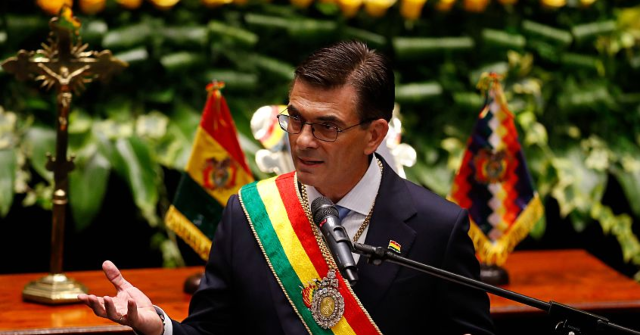Paz, a former senator of the moderate Christian Democratic Party (PDC), took office on Sunday, becoming Bolivia’s new president for the next five years. His inauguration marked the end two decades of MAS’s anti-U.S. rule in the South American country — first under failed wannabe dictator and fugitive of the law on pedophilia allegations Evo Morales and then under Luis Arce.
Unlike his predecessors — who fostered deep ties with the authoritarian regimes of Cuba, Venezuela, Nicaragua, and Iran — Paz has expressed his intention to embrace friendly ties with the United States. Days before taking office, Paz traveled to Washington, seeking support from international institutions to help turn around Bolivia’s dire economic situation caused by two decades of socialist mismanagement. Paz also met with Secretary of State Marco Rubio. The State department said in an official statement that the encounter underscored the United States’ commitment to a strong partnership with Bolivia rooted in mutual prosperity.
Saturday’s inauguration event in La Paz included the participation of several regional heads of state from across the political spectrum, such as Argentina’s Javier Milei, Paraguay’s Santiago Peña, Chile’s Gabriel Boric, and Uruguay’s Yamandú Orsi. President Milei — who, much like Paz, inherited an economy ruined by socialism — told Paz, “I know what you’re receiving, I speak from experience.” Paz responded to his Argentine counterpart saying, “Good advice will be given. We are good at receiving advice.”
U.S. Deputy Secretary of State Christopher Landau led the U.S. delegation to La Paz. Landau arrived at the Bolivian capital on Friday and described the trip as the “most emotional” of his career due to the strained relationship between both countries over the past two decades.
“Our countries have been estranged for 20 years and I’m thrilled, on behalf of President Donald Trump and Secretary of State Marco Rubio, to usher in a new era of cooperation and partnership for the good of both our peoples,” Landau wrote on social media.
Paz responded to Landau’s message saying, “What a pleasure to have you in our little wonder, Deputy State Sec. Thank you for joining us in the rebirth of Bolivia.”
Moments after his Saturday inauguration speech, President Paz met with Landau and, during a press conference, announced the reestablishment of full diplomatic relations between both countries. Landau told reporters that Paz expressed his interest in maintaining good relations with the United States, and stressed, “We want good relations with the Bolivian government, and that is what we will do.”
“Now we are going to reestablish relations at the ambassadorial level, as it should always be. It has been historic that we have not had ambassadors, that is very important,” Landau reportedly said, hoping to announce the names of the ambassadors very soon.
The United States first established diplomatic relations with Bolivia on 1849, with both countries elevating the relations to full Embassy status in 1942. During his first term Evo Morales expelled the U.S. ambassador to Bolivia and suspended the work of the U.S. Drug Enforcement Administration (DEA) in the country, accusing them of allegedly conspiring against him. At the time, Morales claimed, without evidence, that DEA agents were “spying” on him and allegedly maintaining ties with political opponents. Both countries partially “restored” diplomatic ties in 2011, albeit at a significantly strained and tense level. Neither Morales nor Luis Arce allowed the DEA to resume its drug-fighting work in the South American nation.
Paz said during his inauguration speech that Bolivia will never again be subjected to “failed ideologies” and will instead stop turning its back to the world. He emphasized that the country is “devastated” and its economy “bankrupted” after two decades of socialist disasters such as rampant inflation, shortages, debt, and mistrust. The Bolivian president said that his predecessors “left financial holes that are impossible to justify,” stressing that “corruption became the system and lying became state policy.”
“This is the country they left us. What the hell did they do with all that prosperity? Why are there people, families who have nothing to eat today, if we were so rich with so much gas and lithium as our future? They will answer to the nation for the poverty and need of every Bolivian man and woman,” Paz said.
Rodrigo Paz defeated conservative former President Jorge Quiroga in October’s runoff election. MAS, which had a near-monolith rule of Bolivia for nearly two decades, was effectively wiped out from power during August’s general elections, reducing its once majority rule of Congress down to two seats in the Chamber of Deputies and zero Senate Seats.
Christian K. Caruzo is a Venezuelan writer and documents life under socialism. You can follow him on Twitter here.
Breitbart News
Read the full article .


